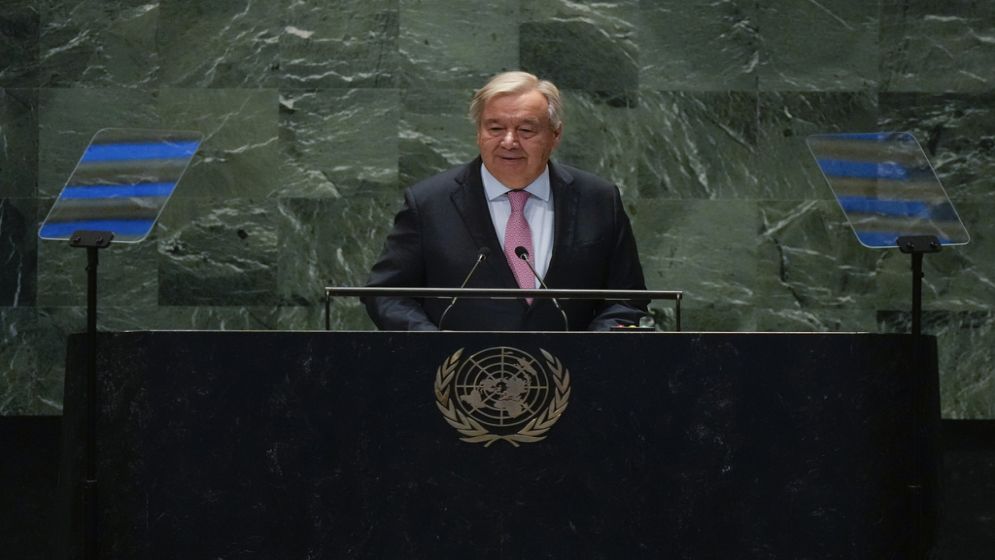World leaders meet under shadow of global divisions, 3 wars and possible Mideast conflict
UNB
Publish: 24 Sep 2024, 04:10 PM

UNITED
NATIONS, Sep 24 (AP/UNB) - World leaders will open their annual meeting at the
U.N. General Assembly Tuesday under the shadow of increasing global divisions,
major wars in Gaza, Ukraine and, Sudan and the threat of an even larger
conflict in the wider Middle East.
Secretary-General
Antonio Guterres previewed his opening "State of the World" speech to
presidents, prime ministers, monarchs and ministers at Sunday's "Summit of
the Future," saying "our world is heading off the rails - and we need
tough decisions to get back on track."
He pointed to conflicts
"raging and multiplying, from the Middle East to Ukraine and Sudan, with
no end in sight" and to the global security system, which he said is
"threatened by geopolitical divides, nuclear posturing, and the
development of new weapons and theaters of war."
He also cited huge
inequalities, the lack of an effective global system to respond to emerging and
even existential threats, and the devastating impact of climate change.
One notable moment at
Tuesday's opening assembly meeting: U.S. President Joe Biden's likely final
major appearance on the world stage, a platform he has tred upon for decades.
U.S. Ambassador Linda
Thomas-Greenfield told reporters last week that the U.S. focus in the assembly
will be on ending "the scourge of war," lamenting that roughly 2
billion people live in conflict-affected areas.
But she also said:
"The most vulnerable around the world are counting on us to make progress,
to make change, to bring about a sense of hope for them."
Among other speakers on
opening day are Brazil's President Luiz Inacio Lula da Silva, Turkey's
President Recep Tayyip Erdogan, King Abdullah II of Jordan, and Iran's new
President Masoud Pezeshkian.
The Iranian leader
accused Israel on Monday of seeking a wider war in the Middle East and laying
"traps" to lead his country into a broader conflict. He pointed to
the deadly explosions of pagers, walkie-talkies and other electronic devices in
Lebanon last week, which he blamed on Israel, and the assassination of Hamas'
political leader Ismail Haniyeh in Tehran on July 31, hours after Pezeshkian's
inauguration.
"We don't want to
fight," the Iranian president said. "It's Israel that wants to drag
everyone into war and destabilize the region. ... They are dragging us to a
point where we do not wish to go." Iran supports both Hamas in Gaza and
Lebanon's Hezbollah militants.
International Rescue
Committee President David Miliband recalled that at the San Francisco
conference in 1945 where the U.N. was established, then-U.S. President Harry
Truman pleaded with delegates to reject the premise that "might makes
right" and reverse it to "right makes might," which was
enshrined in the U.N. Charter.
"Almost 80 years
later, we have seen the terrible consequences of the failure to flip this
equation," Miliband said. "In contexts like Gaza, Sudan and Ukraine,
might is making right."
Facing mounting global
humanitarian needs, unchecked conflict, unmitigated climate change and growing
extreme poverty, Miliband challenged world leaders asking: "How will you
strengthen, not weaken, the principles of the U.N. Charter for the next 80
years?"
The assembly's annual
meeting, which ends on Sept. 30, followed the two-day Summit of the Future,
which adopted a blueprint aimed at bringing the world's increasing divided
nations together to tackle the challenges of the 21st century from conflicts
and climate change to artificial intelligence and women's rights.
The 42-page "Pact
for the Future" challenges leaders of the 193 U.N. member nations to turn
promises into real actions that make a difference to the lives of the world's
more than 8 billion people.
"We are here to
bring multilateralism back from the brink," Guterres said.
By adopting the pact,
leaders unlocked the door, he said. "Now it is our common destiny to walk
through it. That demands not just agreement, but action."
At last year's U.N.
global gathering, Ukraine and its president, Volodymyr Zelenskyy, took center
stage. But as the first anniversary of Hamas' deadly attack in southern Israel
approaches on Oct. 7, the spotlight is certain to be on the war in Gaza and
escalating violence across the Israeli-Lebanon border, which is now threatening
to spread to the wider Middle East.
Palestinian President
Mahmoud Abbas is scheduled to speak Thursday morning and Israel's Prime
Minister Benjamin Netanyahu on Thursday afternoon.
Zelenskyy will get the
spotlight twice. He will speak Tuesday afternoon at a high-level meeting of the
U.N. Security Council called by the United States, France, Japan, Malta, South
Korea and Britain, whose foreign ministers are expected to attend. He will also
address the General Assembly on Wednesday morning.
End/UNB/AP/MB
